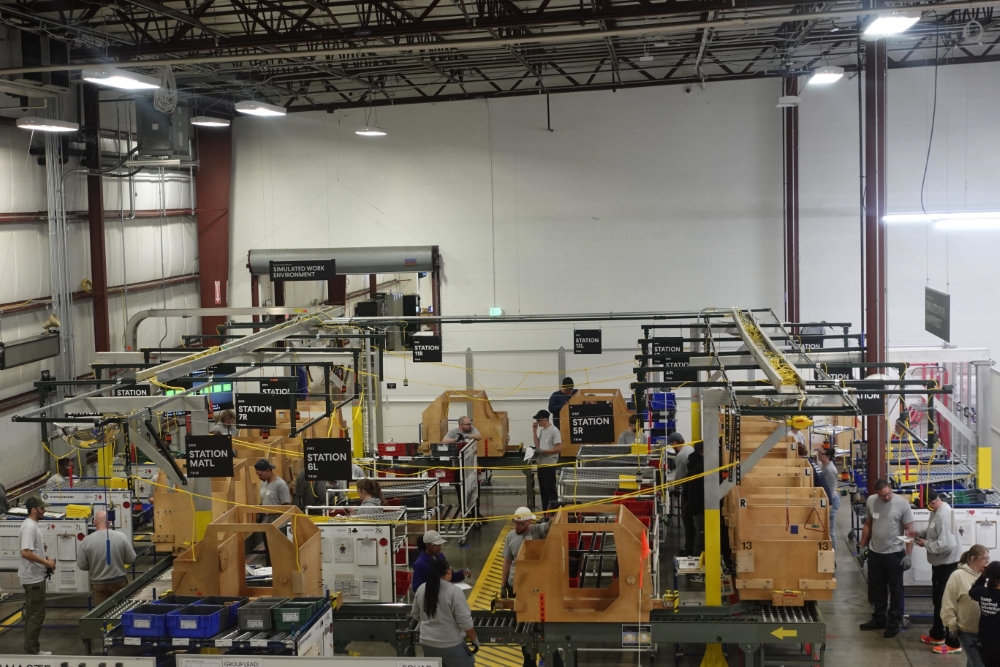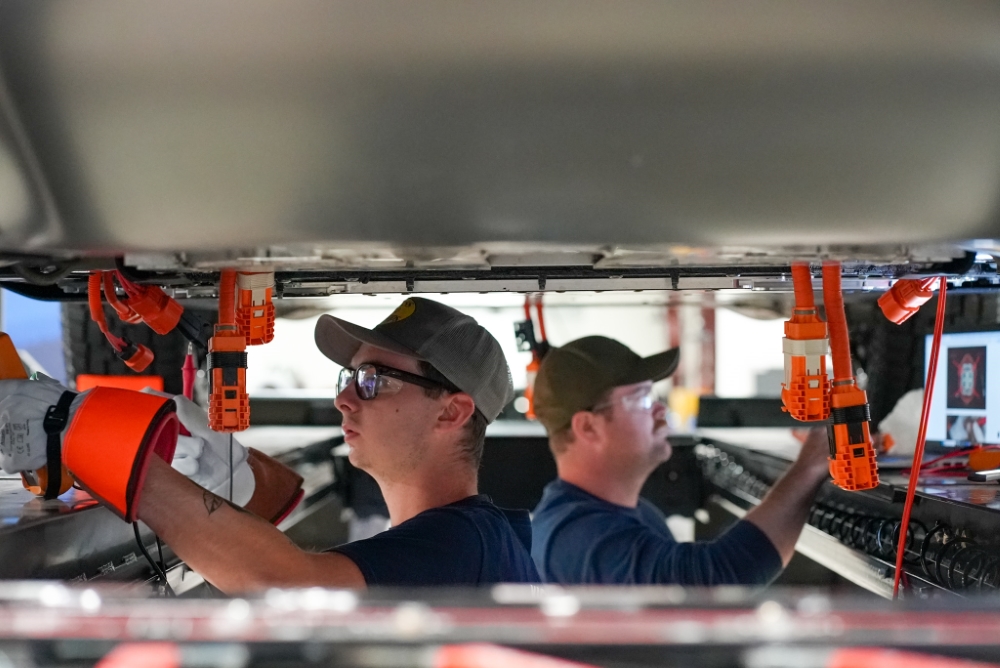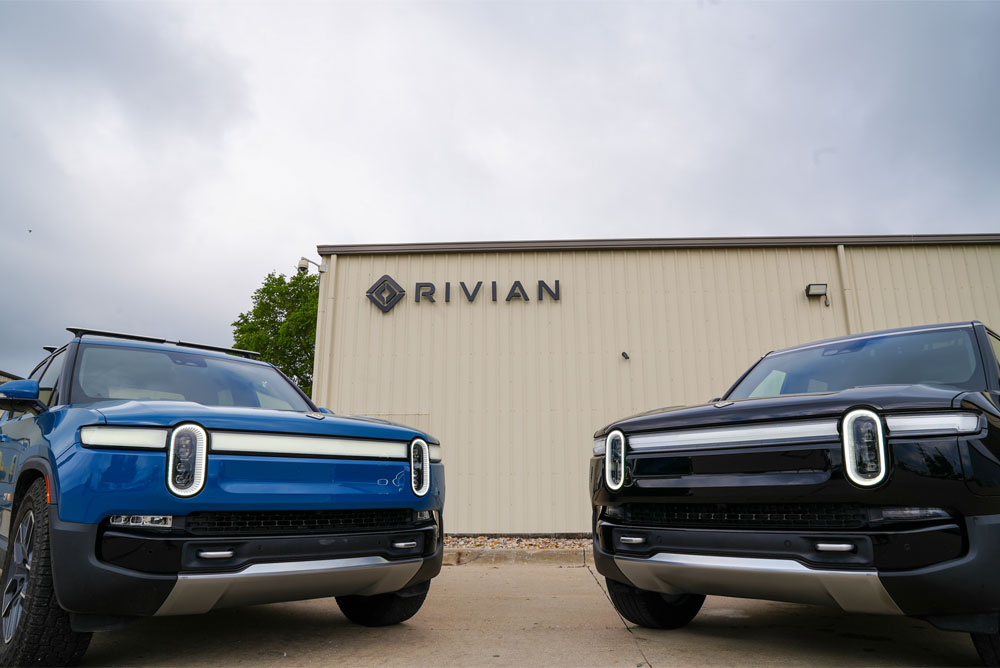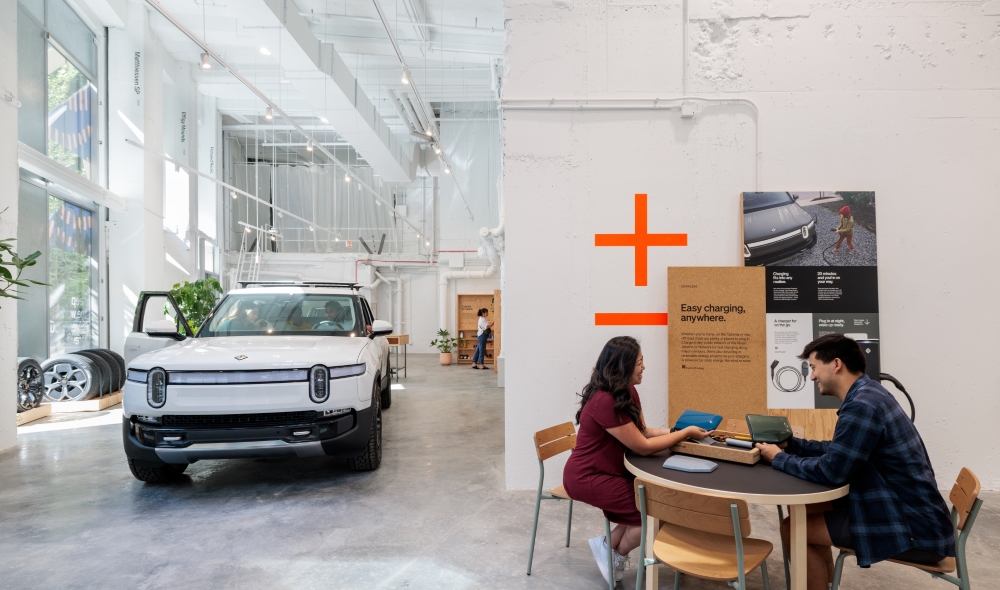Rivian’s growing production base in central Illinois is but one emblem of a statewide focus on growing the clean tech workforce.
As of July 15, 2025, the Illinois Secretary of State’s office had recorded a total registered electric vehicle count of more than 145,000 in the state, nearly double the 76,000 tallied in July 2023 and nearly six times the 25,000 documented in 2020.
Backed by forward-thinking state policies supporting clean energy and clean tech, Illinois is charging up its base of talent and knowledge to meet company requirements, from specialized community college programs to the latest discoveries at recognized EV battery research pioneer Argonne National Laboratory.
There’s no better example than Normal, Illinois, part of the 130,000-strong metro area of Bloomington-Normal, where EV innovator Rivian in 2016 first launched negotiations to purchase the recently closed Mitsubishi Motors plant. Accelerate to today and Rivian employs around 8,500 people from the region as it nears completion of a $1.5 billion, 1.1 million-sq.-ft., 550-job expansion of its nearly 9-million-sq.-ft. manufacturing complex to produce the company’s next-generation R2 model. In early 2025 the company announced a 1.2 million-sq.-ft. supplier park that would add 90 new jobs initially and attract a nearly $120 million investment from Rivian. Before you knew it, seat manufacturer Adient was investing $8 million and pledging to create its own 75 jobs in Normal.
Incentives totaling $633 million from the state through its Reimagining Energy and Vehicles in Illinois (REV Illinois) are important to Rivian’s main plant expansion. But just as important is that next generation of talent. A 12-week intensive internship program has proved successful, including study in such areas as self-driving software development, product development in supply chain and operations, and manufacturing engineering for battery cell development. So have skills training programs such as SkillBridge (for exiting military service members), an emerging technology co-op program and a technical trades program for the company’s service centers throughout the country.
Shortly after the establishment of the manufacturing plant in Normal, Rivian and Heartland Community College successfully collaborated to launch the state’s first EV manufacturing training programs in fall 2021, says Rivian Director of Engineering and Manufacturing Learning and Development Hugh Shadeed. “The public-private partnership continues to strengthen the electric vehicle talent pipeline and drive economic growth in McLean County and surrounding areas,” he says. “Rivian is also working with community groups like the McLean County Chamber of Commerce and Local Workforce Innovation Areas to establish entry level manufacturing programs. Our goal is to leverage community-based organizations like the YWCA, Minority Business Development Center, and others to deliver these programs at no cost to eligible participants.”
Heartland Partnership
In mid-July 2025 Rivian showed more than 40 positions available connected to its site in Normal, including intern positions at UIUC Research Park an hour’s drive away in Champaign, home to the University of Illinois Urbana-Champaign. But one of the most crucial partnerships is right in its Normal backyard, where Heartland Community College (HCC) operates the Electric Vehicle-Energy Storage Manufacturing Training Academy (EVES), featuring a range of certificate and degree programs encompassing the two career pathways EV and energy storage manufacturing offer. The Illinois Department of Commerce and Economic Opportunity (DCEO) supported the construction of the facility with a nearly $7.5 million capital grant, with HCC and employers kicking in $1.5 million in leveraged funds.


Normal, Illinois, is ground zero for Rivian vehicle production and for innovative workforce development partnerships.
Photos courtesy of Rivian

“Heartland Community College currently supports 32 U.S. Department of Labor Registered Apprentices employed by Rivian Automotive in their Rivian Technical Trades program for Industrial Maintenance Technician and Tool and Die Maker,” says Curt Rendall, HCC’s executive director of program development and innovation. “We are now expanding the program into the Production Technologist occupation through a pre-apprenticeship pilot program with the American Association of Community Colleges through their Department of Labor Apprenticeships Building America EV Hub grant.”

“The Manufacturing Training Academy is a game-changer — increasing access to career pathways tied to real wages and real employer demand.”
— Dr. Melanie Whitelow, Director of Continuing Education and Business Partnerships, Kankakee Community College
Overall, HCC’s apprenticeship program includes 102 current apprentices across employers in manufacturing, health care and IT, Rendall says. Moreover, HCC continues to collaborate with other community colleges through state-wide consortia, regular forums and targeted workforce development initiatives including leadership within the Illinois Innovation Network, the Rev Up EV Technology initiative, and the Make It In Illinois campaign, says Rendall, noting that strong partnerships with the Illinois Manufacturers’ Association and the German American Chamber of Commerce Midwest continue to aid HCC in connecting directly with employers.
Multiplying Pathways
In April 2025, TCCI Manufacturing in Decatur celebrated the grand opening of the company’s $45 million, 260,000-sq.-ft. Clean Energy Innovation Hub, which onshores critical EV component manufacturing and provides training and research opportunities. Early in 2023 the department awarded a total of $21 million to Richland Community College & the City of Decatur to create an Electric Vehicle (EV) Innovation Hub, which includes an EV Electric Compressor Component Manufacturing Center, a Climatic Center for Innovation & Research, and an EV + Energy Workforce Training Academy. This first of its kind manufacturing, workforce, and research and development center for excellence will lead to a renovated and expanded manufacturing facility in Decatur, Illinois, completed through a partnership with TCCI Manufacturing, Richland and the City of Decatur. Grant dollars will be used to construct research, education and workforce training spaces. The project will transform the facility to meet critical needs in the EV supply chain, and the expanded investment in climatic research and workforce development initiatives will benefit the entire Illinois EV ecosystem.

Tamika Thomas
“Partnering with TCCI is a game-changer for our students and our community,” adds Tamika Thomas, Director of Climate and Equitable Jobs Act (CEJA) at RCC. “This collaboration gives our students the unique opportunity to learn inside a facility where innovation is happening in real time, where EV and hybrid compressors are designed and built.”
The Climate and Equitable Jobs Act (CEJA), Public Act 102-0662, was passed by the General Assembly and signed into law by Governor Pritzker on September 15, 2021. CEJA includes provisions to phase out carbon emissions from the energy and transportation sectors. The Illinois EPA is directed in CEJA to establish rebate and grant programs for electric vehicles and charging stations and oversee the phase-out of fossil fuel-fired electrical generation units.
The State also has backed an Advanced Manufacturing Academy at Southwestern Illinois College (SWIC) in Belleville, which opened in fall 2024 on the perimeter of the St. Louis metro area. The first phase of the center creates a new precision machining career pathway.
A dozen miles away, State funds totaling $25 million have supported expansion of the Collinsville Area Vocational Center, which will serve growing CTE demand at 10 area high schools (and potentially more). The expansion will allow enrollment to increase from the current 575 to an expected 900 students annually. Career pathways range across 15 areas from cosmetology to auto body and building trades, with new pathways coming in HVAC/R, aviation mechanics, avionics, EMT, and three additional programs to be named at a later date.
Another Manufacturing Training Academy is located at Kankakee Community College (KCC), near where Gotion is building a $2 billion battery plant. KCC annually trains around 1,500 community members through non-credit employment programs, workshops and continuing ed courses in key skills areas. Dr. Melanie Whitelow, the new director of Continuing Education and Business Partnerships at Kankakee Community College, says there’s demand in sectors like manufacturing, logistics and health care across Kankakee County — “which translates into real opportunity for residents ready to upskill. The Manufacturing Training Academy is a game-changer — increasing access to career pathways tied to real wages and real employer demand.
“Our Academy builds on KCC’s existing strengths — like non-credit professional development and continuing education — by offering a dedicated training center focused on in-demand, stackable credentials,” she says. “Local businesses help guide our curriculum to ensure graduates can step into jobs quickly, confidently and with the skills employers need.”

